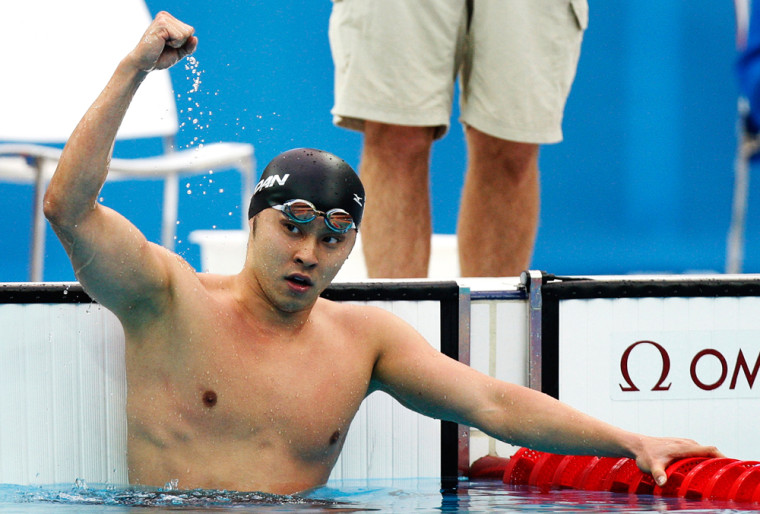Make it a double for Japan’s Kosuke Kitajima.
Again.
Kitajima swept the breaststroke events in his second straight Olympics on Thursday, winning the 200-meter on a relatively light morning for Michael Phelps. Kitajima became the first swimmer to claim both the 100 and 200 gold medals at consecutive games.
With top rival Brendan Hansen not even in the field — the American shockingly failed to qualify for the event at the U.S. trials — Kitajima was an overwhelming favorite. He lived up to the billing, winning easily in 2 minutes, 7.64 seconds.
He came up 0.13 short of his own world record, set in June, but finished a half-body length ahead of silver medalist Brenton Rickard of Australia (2:08.88) to match his two breaststroke golds in Athens four years ago. France’s Hugues Duboscq claimed the bronze in 2:08.94.
American Scott Spann finished sixth.
With five gold medals and five world records already, Phelps finally had a finals-free morning. He merely had to get through a semifinal of the 200 individual medley, then return in the evening for the preliminaries of the 100 butterfly.
Phelps won two golds on Wednesday to become the winningest Olympian ever and finally seemed to grasp what it all means.
“Growing up, I always wanted to be an Olympian,” Phelps said. “I just kept thinking, ’Wow, greatest Olympian of all time.’ It’s a pretty cool title.”
In the span of an hour, he set a world record in the 200-meter butterfly — even though a faulty pair of goggles filled with water during the race — and then came back to lead the first 800 freestyle relay to crack the seven-minute barrier, virtually lapping the rest of the field.
Those were the 10th and 11th gold medals of Phelps’ career, leaving Mark Spitz, Carl Lewis & Co. in the dust. And he’s still aiming to win three more before he leaves China, which would take down the record he really wants: Spitz’s seven-gold performance from 36 years ago.
Everyone else is just a spectator.
“I think he’s undisputedly the greatest swimmer of all time,” longtime Italian coach Alberto Castagnetti said. “He’s stratospheric, in technical terms and in terms of mental preparation. I’ve never seen anyone like him.”
Castagnetti should know. He raced against Spitz at the Munich Games.
“Spitz was much more limited,” the coach said. “He had two races that were similar, freestyle and butterfly, and he had a team behind him for the relays in which even I could have won.”
These are the finals Phelps has left:
- Friday, 200 individual medley: Teammate and fellow hip-hop aficionado Ryan Lochte certainly makes this a potential stumbling block, considering he put up the third-fastest time in history at the U.S. trials last month. Then again, Phelps set a world record in that same race and will benefit from Lochte trying to pull off a tough double, also racing in the 200 backstroke on the same morning.
- Saturday, 100 butterfly: American Ian Crocker holds the world record, but he set that mark three long years ago. Phelps has won nearly every big race between the two, including the 2004 Olympics, last year’s world championships and the most recent U.S. trials, where he pulled away to an easy win. Crocker will be well rested, however, since this is his only individual event.
- Sunday, 400 medley relay: The U.S. has never actually lost this event at the Olympics, the only blip on its perfect record coming in 1980 when the Americans boycotted. This is about as sure of a lock as Phelps will have at these games, though there is always the chance of a stumble. Remember Crocker jumping in too early on a relay exchange during what should have been a routine prelims swim at last year’s world championships? The Americans were disqualified, denying Phelps the chance to win an eighth gold.
Judging by the way he’s swimming in China, it would likely take a similar fluke for Phelps to miss out on Spitz’s record.
“He is just a normal person, but maybe from a different planet,” said Russia’s Alexander Sukhorukov, fresh off a thrashing by the Phelps-led Americans in the 800 free relay Wednesday but still wearing a silver medal around his neck.
Cornel Marculescu, who runs the sport’s governing body, was ready to accept the intergalactic theory.
“The problem is, we have an extraterrestrial,” Marculescu said. “No one else can win.”
British swimmer Simon Burnett has a different take, which he shared with American men’s coach Eddie Reese when they ran into each other in the cafeteria.
“He was saying to me, ’I think I’ve figured out Michael Phelps,”’ Reese said. “’He is not from another planet; he is from the future. His father made him and made a time machine. Sixty years from now he is an average swimmer, but he has come back here to mop up.”’
Science fiction aside, the 23-year-old from Baltimore is clearly swimming off the charts in Beijing.
After a six-gold performance at the 2004 Athens Games, Phelps needed only five days here to surpass Spitz, Lewis, Soviet gymnast Larysa Latynina and Finnish runner Paavo Nurmi as the winningest Olympian ever.
“Being on the team with him these past couple of years, a lot of us take what he does for granted,” said American Natalie Coughlin, who’s won three medals of her own at these games but barely has gotten noticed. “We expect him to break world records. We expect him to win.”
